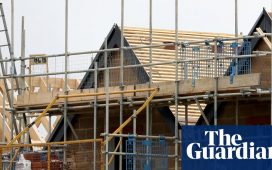Unlock the Editor’s Digest for free
Roula Khalaf, Editor of the FT, selects her favourite stories in this weekly newsletter.
The House of Lords is set to debate the leasehold reform bill on Friday in a final rush to push through key legislation ahead of the UK general election on July 4.
Campaigners had feared that the bill would be among the measures scrapped as parliament dissolved, but the upper house announced late on Thursday that it would consider the bill during the final hours of the “wash-up” period when legislation can be rushed through.
The bill makes big changes to the system of leases under which about 5mn homeowners in England have rights to their property for a fixed period, and often pay fees and ground rents to a freeholder.
The measures include banning most new leasehold houses, making it easier for leaseholders to buy out or extend their lease and increasing transparency around service charges.
Campaigners urged the Lords to pass the law. “The bill is not perfect, but it is the only game in town for leaseholders,” said Harry Scoffin, founder of the campaign group Free Leaseholders.
He praised both Prime Minister Rishi Sunak and the Labour party for pushing the bill in the wash-up period, saying: “They have not played political games here.”
The British Property Federation, the real estate industry group, said it supported large parts of the current bill but that “there are several other contentious proposals . . . which we would argue should not be passed”.
The government also consulted on plans to cap all ground rents at nominal levels, a policy favoured by levelling up secretary Michael Gove. In March, opposition from the Treasury forced Gove to compromise and instead pursue a £250 cap. This policy had not been finalised when Sunak on Wednesday called an election, and could be dropped.
Freehold owners of these properties have also lobbied hard against measures in the bill, including changes to the financial calculations when leaseholders want to extend or buy out their lease, which the owners argue would hurt the value of their investments.
Some companies have threatened to sue the government for interfering with their property rights, which could become a headache for the next government if the bill is passed.
The Residential Freehold Association, which represents some freeholders, said: “The leasehold and freehold reform bill is a defective and poorly evidenced piece of legislation which has ignored the outcomes of consultation with industry and leaseholders.”











